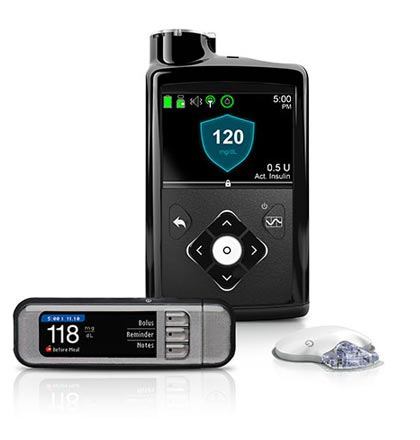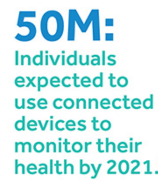Can Artificial Intelligence Save Healthcare? Medtronic and IBM Watson: A Perfect Match

Medtronic is a first mover in diabetes care with the use of artificial intelligence to improve patient outcomes.

With the impending shift to an outcomes-based payment model in the United States, Medtronic has positioned themselves as the leader in Diabetes insulin delivery. Currently in the fee-for-service model, doctors are paid based on number of patients seen and quantity of procedures done, not quality of care. To switch to a value-based care approach, the onus is on the healthcare companies to prove they are providing better outcomes for patients at a lower cost1. In order to do this Medtronic will need to leverage artificial intelligence and data analytics to prove that there is value and cost savings in using this innovative digital technology.
Considered widely as a revolutionary treatment for Type 1 Diabetes patients, in March 2017 Medtronic launched the first hybrid artificial pancreas MiniMed 670G system2. This insulin pump combines a Continuous Glucose Monitor (CGM) and Medtronic’s dynamic proprietary algorithm, in which they partnered with IBM Watson to create. This is the only device in diabetes care to continuously track and provide personalized insulin dosages every five minutes based on real-time glucose values3. The belief is that by taking the grueling insulin calculations out of the patients’ hands and calculating through an algorithm, it will prevent expensive and life-threatening hospital visits. The algorithm controls the flow of insulin to the patient and would adjust based on individualized needs including physical activity, absorption of food, and carbohydrate intake in order to keep a patient within a target glucose range4.

Medtronic is also the first insulin pump manufacturer to commit to a value-based payment with UnitedHealthcare on the assumption that they could decrease costs related to managing diabetes by delivering a patient-centered solution5. The only way Medtronic could do this was by being able to provide the data to UnitedHealthcare to show that proper use of their insulin pumps resulted in fewer preventable hospital visits compared to patients who were using multiple daily injections of insulin (MDI) through insulin pens. Results from the first year under the agreement proved that insulin pumps decreased preventable hospital visits by 27% compared to MDI therapy6.
The Future of Diabetes Management
More than 12.1 million people with diabetes visit the emergency room every year. This amounts to $60 billion in preventable costs7. These numbers are astonishing and without a massive improvement in diabetes management will continue to bankrupt our healthcare system. Medtronic has an opportunity to completely revolutionize Diabetes care by making it entirely effortless for patients to manage their disease. By creating a fully automated artificial pancreas that could be used in patients with Type 1 or Type 2 Diabetes, Medtronic could help to decrease the growing costs of Diabetes management which is currently estimated at $250 Billion in the United States8. Medtronic’s pipeline shows that in the next five years they will create a completely personalized artificial pancreas that utilizes different sensor inputs to automatically dose insulin without user input and refines the insulin dosing algorithm to adapt to a user’s daily patterns9. By compiling data and creating predictive analytics, Medtronic can help drive meaningful insights to patients, providers, and payers to help move the fragmented U.S. healthcare system towards integration. Ideally these efforts could target patients early for interventions and improve their health behavior to lower costs and improve patients’ lives.

Looking Ahead
Although Medtronic already has a contract with UnitedHealth, how will other payers feel about the cost of these devices, especially in the United States where patients switch insurers frequently, and the payer may never see the long-term cost savings? This technology is also extremely expensive to develop and takes a very long time to refine and prove through clinical trials. How will shareholders feel about this value proposition, when Medtronic does not have expertise in the artificial intelligence or data analytics space?
(748 words)
Sources:
1 Tilleskjor, Sara, “Value-Based Healthcare: A New Approach to Diabetes Care,” Between the Lines (blog), July 6, 2016, [https://www.medtronicdiabetes.com/blog/value-based-healthcare-new-approach-diabetes-care], accessed November 2018.
2 “Real-World Data from the MiniMed™ 670G System Commercial Launch—Patients Previously Using MDI Therapy,” Diabetes Journal Vol. 67, Supplement 1 (July 2018).
3 “Three Keys to Unlocking Data-Driven Healthcare,” sponsored by Medtronic, Harvard Business Review Analytic Services, November 14, 2017, [https://hbr.org/sponsored/2017/11/three-keys-to-unlocking-data-driven-health-care], accessed November 2018.
4 Medtronic. “670G: The Math Guys Who Made it Possible.” Press release, February 2018. [http://www.medtronic.com/us-en/about/news/670G-math-guys.html] accessed November 2018.
5 Medtronic. “First-Year Results from Medtronic and UnitedHealthcare Value-Based Relationship Demonstrate Cost-Savings and Reduced Hospital Admissions.” Press release, July 10 2018. [http://newsroom.medtronic.com/phoenix.zhtml?ID=2357635&c=251324&p=irol-newsArticle] accessed November 2018.
6 Ibid.
7 Ibid. Tilleskjor, Sara, “Value-Based Healthcare: A New Approach to Diabetes Care,” Between the Lines (blog), July 6, 2016, [https://www.medtronicdiabetes.com/blog/value-based-healthcare-new-approach-diabetes-care], accessed November 2018.
8 Ibid. “Three Keys to Unlocking Data-Driven Healthcare,” sponsored by Medtronic, Harvard Business Review Analytic Services, November 14, 2017, [https://hbr.org/sponsored/2017/11/three-keys-to-unlocking-data-driven-health-care], accessed November 2018.
9 “Therapy Innovation: Diabetes.” Powerpoint Presentation, June 5, 2018, Institutional Investor & Analyst Day, New York City, NY. [http://investorrelations.medtronic.com/phoenix.zhtml?c=76126&p=irol-calendarpast_pf] accessed November 2018.
10 Meaningful Innovation: The Spirit that Drives Us. From Medtronic website, http://www.medtronic.com/content/dam/medtronic-com/global/Corporate/meaningful-innovation/documents/meaningful-innovation-spirit-that-drives-us-perspective-mdt-mi-corpmark.pdf, accessed November 2018.
11 Medtronic. “When AI Meets Healthcare.” Press release, May 11, 2018. [http://www.medtronic.com/us-en/about/news/ai-meets-healthcare.html] accessed November 2018.
[Image 1]: Meaningful Innovation: The Spirit that Drives Us. From Medtronic website, http://www.medtronic.com/content/dam/medtronic-com/global/Corporate/meaningful-innovation/documents/meaningful-innovation-spirit-that-drives-us-perspective-mdt-mi-corpmark.pdf, accessed November 2018.



AI in medicine naturally lends itself to personalization of health care. If wealthy members of society would pay 10X more for this level of care, would this ultimately decrease the amount of time and money spent on “generalized” health care (what we think of today as drug discovery, etc.)? And if so, does this imply a bifurcation in healthcare between the haves and the have-nots?